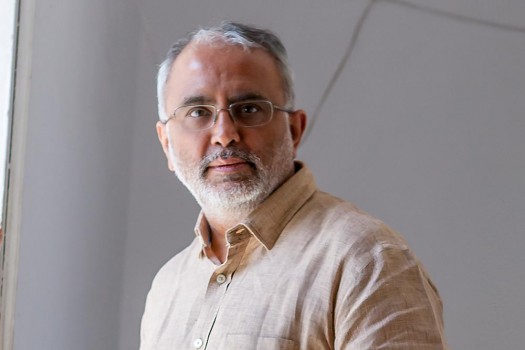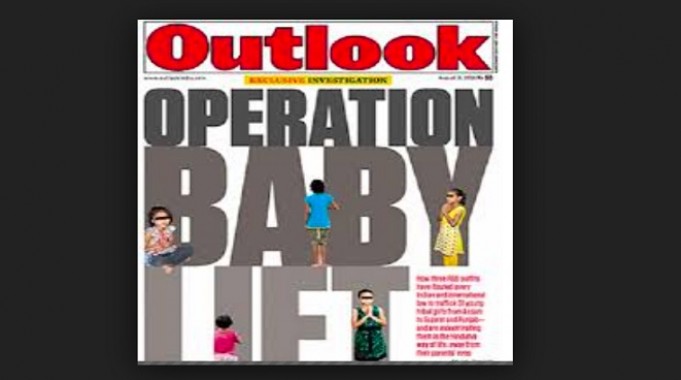Outlook refuses to be muzzled by FIR over its story
“Threats against journalists may be an occupational hazard but what we are seeing today is a more serious attempt to shoot the messenger. The country is fast hurtling down a fascist mode and this fiction of public narrative of demonizing journalists is dangerous for free speech,” said Outlook editor Krishna Prasad.

Outlook editor Krishna Prasad
Prasad was reacting to the news of a complaint lodged in Guwahati, Assam, against him, Outlook publisher Indranil Roy and writer of the article Neha Dixit for the story 'Operation #betiuthao,' published in the July 29 issue of the magazine. The story dealt with the trafficking of 31 young tribal girls out of Assam by organisations affiliated with the Sangh Parivar and the Rashtriya Swayamsevak Sangh (RSS) and attempts to ‘Hinduise’ them.
Last Saturday, an FIR was registered at the Latasil Police Station in Guwahati under Sec 153A of the Indian Penal Code based on a complaint by the state Assistant Solicitor General of the Government of India, Subhash Chandra Koyal, and BJP spokesperson and advocate Bijan Mahajan. The crime carries a punishment of imprisonment of up to three years for anyone who, either by words or signs or any kind of visual representation, promotes disharmony or enmity, hatred or ill-will amongst people of different communities.
“We haven’t formally received any complaint as yet but we have read the news on the complaint against Outlook for our story. Our lawyers are advising us. We will draft a response and move to quash the complaint”, said Prasad.
The news of the filing of an FIR was first reported in newspapers in Assam. More than 100 journalists, academics and civil society activists have issued statements condemning attempts to silence the media and demanded that the complaint be quashed.
The 11,000 word story was carried in five parts. According to the Outlook report, it was the result of a three-month long investigation where the magazine accessed government documents which showed how different Sangh outfits trafficked 31 tribal girls as young as three years from the tribal areas of Assam to Punjab and Gujarat. Orders to return the children to Assam - including those from the Assam State Commission for the Protection of Child Rights, the Child Welfare Committee Kokrajhar, the State Child Protection Society, and Childline, Delhi and Patiala - were violated by Sangh-run institutions with the help of the Gujarat and Punjab governments, the report said.
The Assam State Commission for the Protection of Child Rights (ASCPCR) has called these incidents “against the provision of Juvenile Justice Act 2000” and concluded that they amount to “child trafficking”.
Families of the girls said they made repeated attempts to meet them but were thwarted. In a few instances where they did manage to meet the girls, they found their daughters unrecognizable. Their names had been changed to Hindu names and they spoke Gujarati, not Assamese.
The complaint (a copy of which is with The Hoot) quotes a single sentence in the 11,000 word article about the attempts to engineer hostility between different tribes in Assam: “For the Bodos, there’s now a manufactured hostility to Islam and Christianity, and an artificially heightened hostility to the Santhals and Mundas. Encouraged by the Sangh Parivar, the institutions of family, religion and patriarchy push naive tribal girls and their parents into a path of indoctrination that encourages incessant conflict. Worse, it strips them of the power to exercise faculties not in line with the elite-caste Hindutva mainstream”.
“In what way was our story causing enmity?” asked Prasad, adding, “Frankly, the mirror is on the other side!”The complaint, he felt, was part of the continuous attempts to intimidate and harass journalists in India for their stories. In fact, it provided a perspective to the social issue of the trafficking of young girls, which was actually the serious question any conscious citizen should have addressed.
Dixit, the journalist who investigated the issue and wrote the report, is not an Outlook staff writer but an independent journalist. “But that’s not an issue. She has written for us in the past too and we are defending her story completely”, Prasad said.
He felt that media organisations and journalists’ unions need to urgently formulate strategies to combat these attempts to muzzle the media. “We need to speak up against intimidation by ministers like Parrikar who issue statements against Hindi film actor Aamir Khan or the threats issued to owners and proprietors to change or drop editors who are critical or independent”, he said.
The manner in which the BJP government bypasses the established media and communicates via social media is worrisome, he felt, adding that ‘there are very concerted attempts at essentially manufacturing consent’. He added: “We must try and draw the attention of international bodies to the plight of the media in our country. We pride ourselves on being a democracy and silence the media from Kashmir to Kerala,’’ he said, angrily.
Today, the Press Club of India, the Indian Women’s Press Corps and the Editor’s Guild, are holding a meeting in Delhi to protest against these increasing attacks on journalists. A statement from these organisations listed the recent attempts to muzzle Rajasthan Patrika by denying it advertising, the complaint against Outlook, the killings of journalists in Bihar, Uttar Pradesh and Madhya Pradesh, and the temporary ban on newspapers in Jammu and Kashmir during the recent unrest after the killing of separatist youth leader Burhan Wani.







